What is a cliché? What are common cliché’s that are said in everyday english? A cliché is a phrase or idea that get used to the extent that has lost the original meaning and allure. You’ve most likely heard a cliché and maybe don’t know it. Let’s jump into what a cliché is an how to use them.
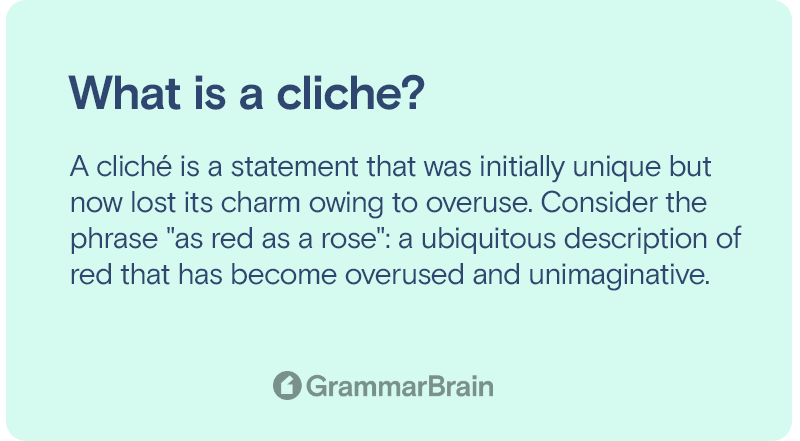
What is a Cliché?
A cliché is a statement that was initially unique but now lost its charm owing to overuse. Consider the phrase “as red as a rose”: a ubiquitous description of red that has become overused and unimaginative.
Clichés also incorporate time markers such as “in the nick of time” and “at the speed of light.” Sayings describing emotions include phrases like “head over heels” to depict love and “every cloud has a silver lining” to show hope in terrible situations.
Definition of the word cliché
According to the Cambridge dictionary, a cliche is “An overused notion or term that is generally seen as a sign of poor writing or outdated thinking.”
Cliche vs. metaphor
We constantly hear and read clichés and metaphors in novels, movies, and everyday speech. We utilize them because they assist readers and listeners in getting a more vivid image. But Clichés and metaphors in writing, on the other hand, can diminish the power of a passage.
The term cliché comes from the French verb clicher, which means “to stereotype.” Clichés are ideas or phrases that became stale because of over-usage.
Let’s take a look at some popular cliches:
A metaphor is a term that makes a nonliteral and frequently symbolic comparison. It frequently states that something is something other.
Shakespeare’s famous remark, “All the world’s a stage”, is one example where he used metaphor, but the world is not actually a stage; hence this is a metaphor.
Let’s look at some overused metaphors:
- Life is a journey
- Love is a battlefield
- Laughter is the best medicine
- Time is money
Popular and common clichés
Here are some examples of popular Cliches.
- A blast from the past.
- A bun in the oven.
- A curate’s egg
- A shot in the arm.
- A wolf in sheep’s clothing.
- Absolute power corrupts absolutely.
- All hell breaks loose.
- All in a day’s work.
- All that jazz.
- All that glitters is not gold.
- Any port in the storm.
- Anything goes.
- As easy as pie.
- Baby boomer.
- Bad blood.
- Be there or be square.
- Beat a dead horse.
- Best thing since sliced bread.
- Better than ever.
- Call the shots.
- Carbon copy.
- Carry the team.
- Cash it in.
- Champagne tastes and a beer budget.
- Cheap thrills.
- Cry me a river.
- Darkhorse.
- Do not go there.
- Do not look a gift horse in the mouth.
- Don’t look back.
- Don’t judge a book by its cover.
- Don’t make a fuss.
- Dream on.
- Early to bed, early to rise.
- Easy as 1, 2, 3.
- Eat dirt.
- Eye to eye.
- Fair and square
- Fair-weather friend.
- Fancy meeting you here.
- Fine line.
- Get a room.
- Get cleaned out.
- Get lost.
- Get one’s goat.
- Good as new.
- Happily ever after.
- Hands-on.
- Hang by a thread.
- Hard to swallow.
- Harp on.
- He who hesitates is lost.
- He who laughs last laughs best.
- Head over heels.
- I beg to differ.
- I can’t stand it.
- The icing on the cake.
- If I were in his shoes.
- If looks could kill.
- If the shoe fits, wear it.
- I’ll be damned.
- In your dreams.
- It’s on the tip of my tongue.
- Jack of all trades, master of none.
- The jury is still out.
- Just admiring the view.
- Justice is blind.
- Keep it up.
- Keep something at bay.
- Keep your eyes peeled.
- Kill them with kindness.
- Kiss and tell.
- Knock on wood.
- La dolce vita.
- Left at the altar.
- Less is more.
- Lesser of two evils.
- Let them eat cake.
- Lift me up.
- Like a broken record.
- Like a kid in a candy store.
- Love is blind.
- To make a long story short.
- Time heals all wounds.
- Madder than a wet hen.
- Make ends meet.
- Makeup.
- Makes my blood boil.
- Melting pot.
- Misery loves company.
- Never say never.
- Nip and tuck.
- No guts, no glory.
- Off the shelf.
- Off the record.
- One for the books.
- One size fits all.
- Phone it in.
- Pick over the ruins.
- Play ball.
- Queen for a day.
- Plenty of fish in the sea.
- Raking it in.
- Rough around the edges.
- Running with wolves.
- Safe and sound.
- Save your breath.
- Shed some light on.
- She’s fighting a losing battle.
- Someday, you will thank me for this.
- Talk to the hand.
- That gets my goat.
- That takes the cake.
- The third time’s a charm.
- This could be us, but you are playing.
- Time after time.
- Twice as nice.
- Under my skin.
- Upper hand.
- Urban myth.
- Wait and see.
- Wave the white lag.
- Wear the pants.
- Wish you were here.
- You bet your boots.
- You can never go home again.
- You drive me nuts.
- You snooze, you lose.
- Zip it!
Common sayings
Here are some examples of common cliches.
- “Saved by the bell.”
- “Open a can of worms.”
- “Read between the lines.”
- “All that glitters isn’t gold.”
- “Kiss and make-up.”
- “Live and let live.”
- “Sharp as a tack.”
- “Dumb as a doorknob.”
- “It is what it is.”
- “We’re not laughing at you. We’re laughing with you.”
- “All for one, one for all.”
- “Absence makes the heart grow fonder.”
Cliches about time
Below is the list of some cliches about time.
- “Time flies.”
- “Lasted a lifetime.”
- “A waste of time.”
- “At the speed of light.”
- “In the nick of time.”
- “Time will tell.”
- “Old as the hills.”
- “Brave as a lion.”
- “Diamond in the rough.”
- “Without a care in the world.”
Cliches about people
- “As old as the hills.”
- “Fit as a fiddle.”
- “Without a care in the world.”
- “A diamond in the rough.”
- “Brave as a lion.”
- “Weak as a kitten.”
- “Had nerves of steel.”
- “Ugly as sin.”
Cliches about life
- “A watched pot never boils.”
- “A picture is worth a thousand words.”
- “Old habits die hard.”
- “The early bird catches the worm.”
- “Laughter is the best medicine.”
- “People in glass houses shouldn’t throw stones.”
Cliches about emotions
Below is a list of some cliches about emotions
- All the Rage
- Meeting of the Minds
- Scare the Living Daylights out of Someone
- Out of Sight, Out of Mind
- Tear-Jerker
- Pet Peeve
- Pull Yourself Together
- Get Carried Away
- Think Big
- Not Playing with a Full Deck
- Under the Impression
- Out of Sorts
- Short Fuse
- Off One’s Rocker
- Bang One’s Head Against the Wall (Against a Brick Wall)
- Young at Heart
- Take It Easy
- Passing Fancy
- On the Ball
- On the Fence
- Living in Cloud Cuckoo land
- Mad as a Hatter
- Freudian Slip
- Fly off the Handle
- Draw a Blank
- Drive Someone Up the Wall
- Down in the Dumps
- Chuck a Wobbly
- Cock-A-Hoop
- Blow One’s Stack
- At the End of One’s Rope (Tether)
- At Wit’s End
- Air Rage
- Act One’s Age
Hidden meanings in cliché
We’ve just gotten to the bottom of this subject. The English language has thousands of clichés. Most of them have apparent meanings; others have connotations that only become obvious if you understand the context.
For example, the phrase “any port in a storm” has an underlying meaning. The apparent message is that in dire circumstances, any assistance will suffice. However, this cliche could also be applied to describe someone with numerous partners.
Context-Driven Meanings
Certain clichés can be viewed differently depending on the circumstance. “Do you think I’m made of money?” for example. “It’s as if I’m made of money” sound similar, don’t they?
More context is required to determine if the person speaking is complaining or boasting. “Do you think I’m made of money?” suggests that you don’t. “It’s like if I’m made of money” might indicate that you have a lot of money. However, to fully understand this sentence’s significance, we’d need to converse further with the person speaking.
Interpretation-Driven Meanings
Not all clichés are, however, necessarily true. Some are up to interpretation.
As an example:
“With knowledge comes experience, and with experience comes wisdom” does not apply to everyone’s life.
As we’ve seen, certain clichés are hard and dry, such as “He has steel nerves.” Others are left up to interpretation. As time passes, you may learn to interpret them differently, accept or disregard their interpretations, and even coin your own clichés.
Cliche and idioms
Idioms are metaphorical statements with hidden meanings; the phrase should not be interpreted seriously. “Having a chip on your shoulder” is an example of an idiom. That suggests you believe you are superior compared to everybody else.
Clichés are frequently idioms. Because of this, it is challenging to translate clichés into some other languages as individuals from different societies seldom recognize their essence.
Popular and common clichés (examples of clichés images)
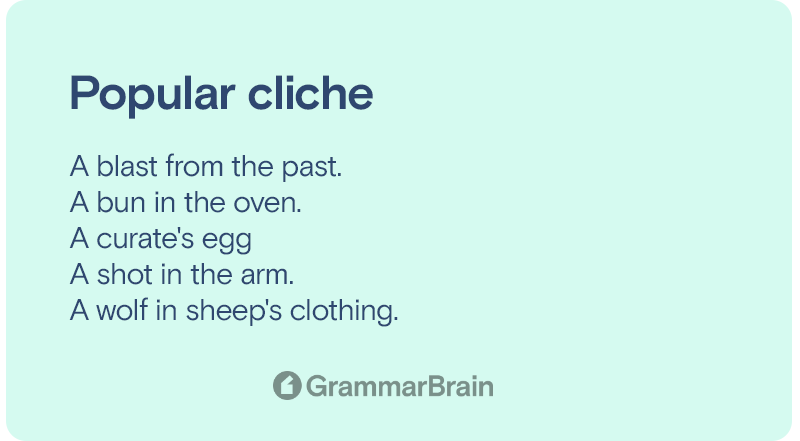
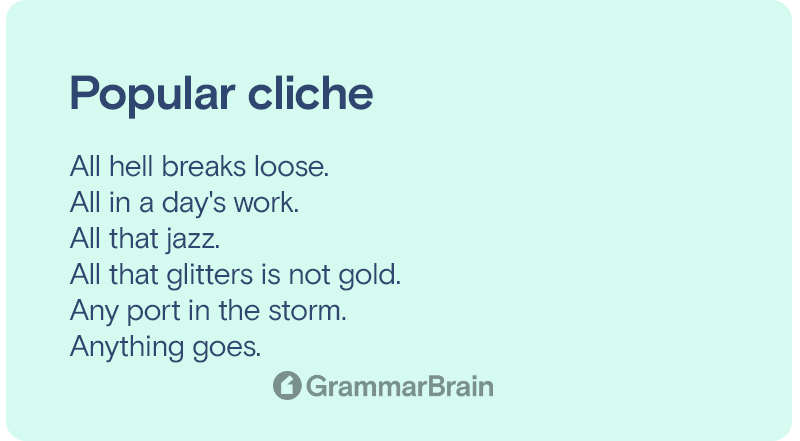
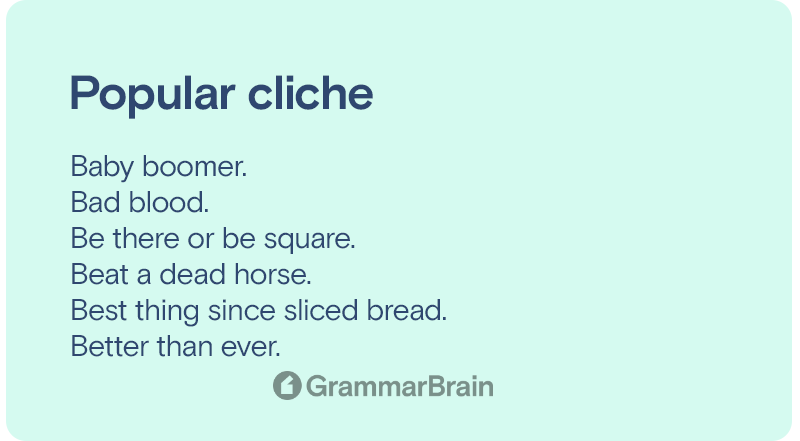
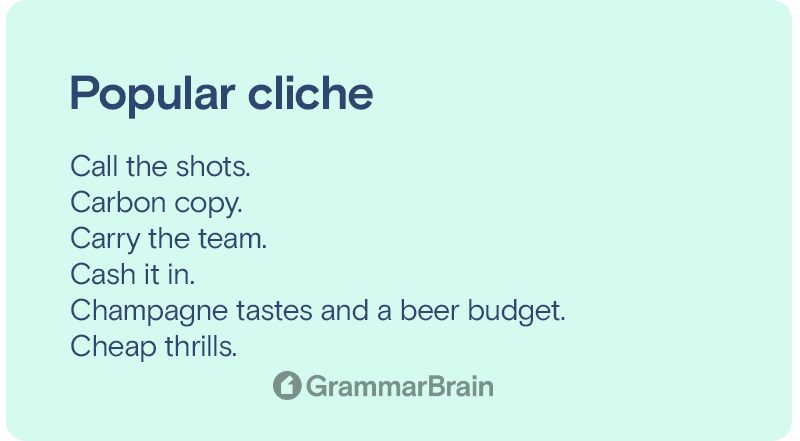
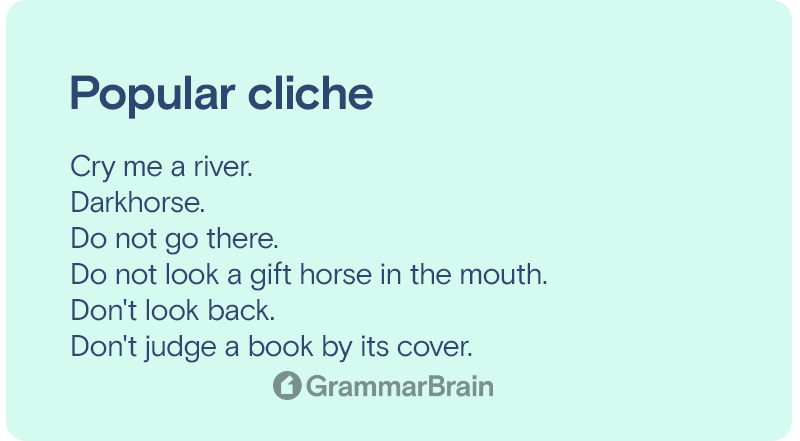
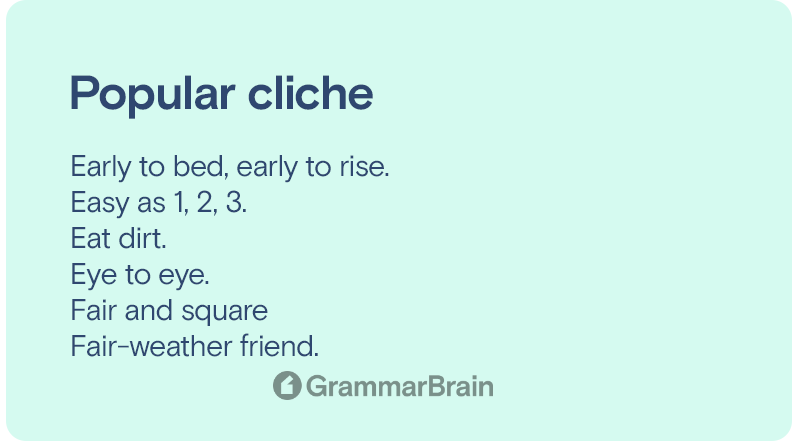
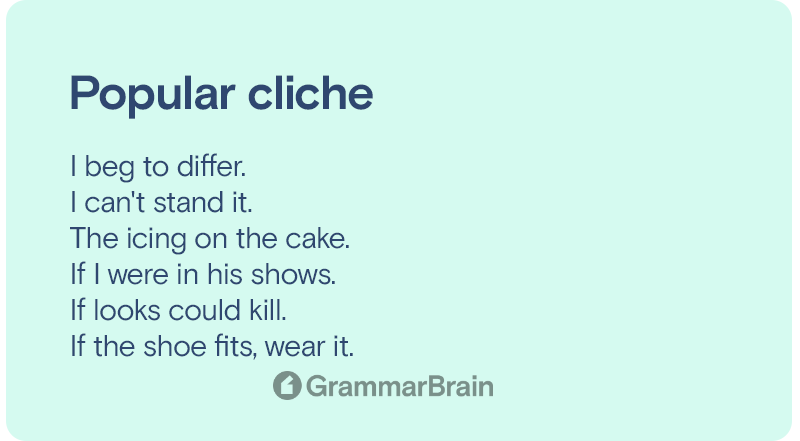
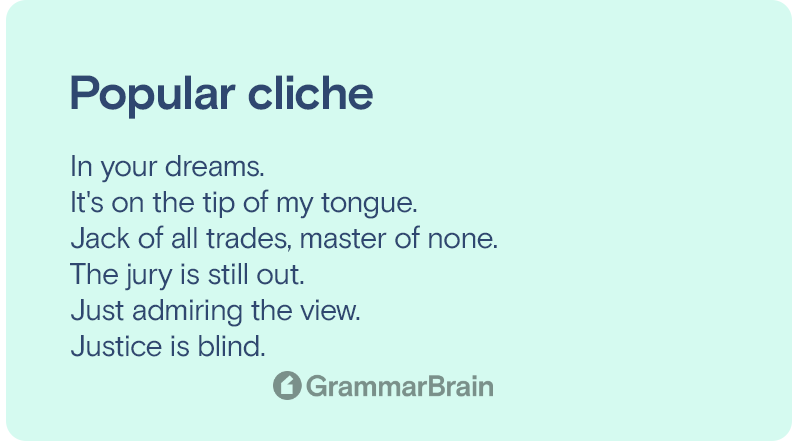
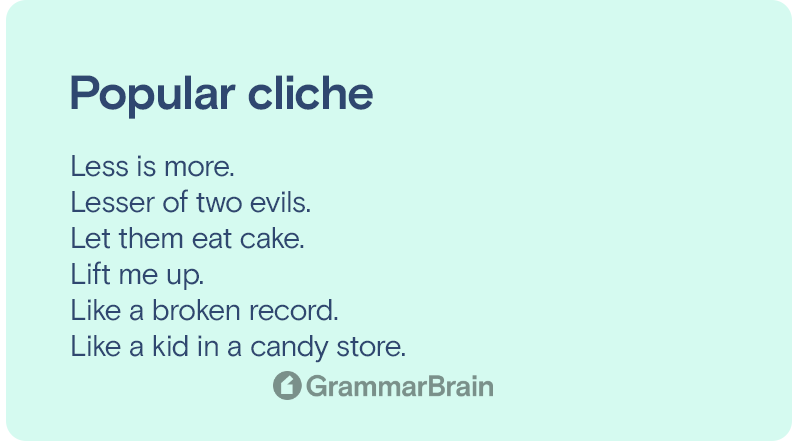
FAQs
Why do people use clichés?
A cliche is used to help connect common concepts and ideas into short, understandable phrases. Using clichés is a way of providing relative connection to a thought.
Inside this article
Fact checked:
Content is rigorously reviewed by a team of qualified and experienced fact checkers. Fact checkers review articles for factual accuracy, relevance, and timeliness. Learn more.
Core lessons
Glossary
- Abstract Noun
- Accusative Case
- Anecdote
- Antonym
- Active Sentence
- Adverb
- Adjective
- Allegory
- Alliteration
- Adjective Clause
- Adjective Phrase
- Ampersand
- Anastrophe
- Adverbial Clause
- Appositive Phrase
- Clause
- Compound Adjective
- Complex Sentence
- Compound Words
- Compound Predicate
- Common Noun
- Comparative Adjective
- Comparative and Superlative
- Compound Noun
- Compound Subject
- Compound Sentence
- Copular Verb
- Collective Noun
- Colloquialism
- Conciseness
- Consonance
- Conditional
- Concrete Noun
- Conjunction
- Conjugation
- Conditional Sentence
- Comma Splice
- Correlative Conjunction
- Coordinating Conjunction
- Coordinate Adjective
- Cumulative Adjective
- Dative Case
- Determiner
- Declarative Sentence
- Declarative Statement
- Direct Object Pronoun
- Direct Object
- Diction
- Diphthong
- Dangling Modifier
- Demonstrative Pronoun
- Demonstrative Adjective
- Direct Characterization
- Definite Article
- Doublespeak
- False Dilemma Fallacy
- Future Perfect Progressive
- Future Simple
- Future Perfect Continuous
- Future Perfect
- First Conditional
- Irregular Adjective
- Irregular Verb
- Imperative Sentence
- Indefinite Article
- Intransitive Verb
- Introductory Phrase
- Indefinite Pronoun
- Indirect Characterization
- Interrogative Sentence
- Intensive Pronoun
- Inanimate Object
- Indefinite Tense
- Infinitive Phrase
- Interjection
- Intensifier
- Infinitive
- Indicative Mood
- Participle
- Parallelism
- Prepositional Phrase
- Past Simple Tense
- Past Continuous Tense
- Past Perfect Tense
- Past Progressive Tense
- Present Simple Tense
- Present Perfect Tense
- Personal Pronoun
- Personification
- Persuasive Writing
- Parallel Structure
- Phrasal Verb
- Predicate Adjective
- Predicate Nominative
- Phonetic Language
- Plural Noun
- Punctuation
- Punctuation Marks
- Preposition
- Preposition of Place
- Parts of Speech
- Possessive Adjective
- Possessive Determiner
- Possessive Case
- Possessive Noun
- Proper Adjective
- Proper Noun
- Present Participle
- Prefix
- Predicate



